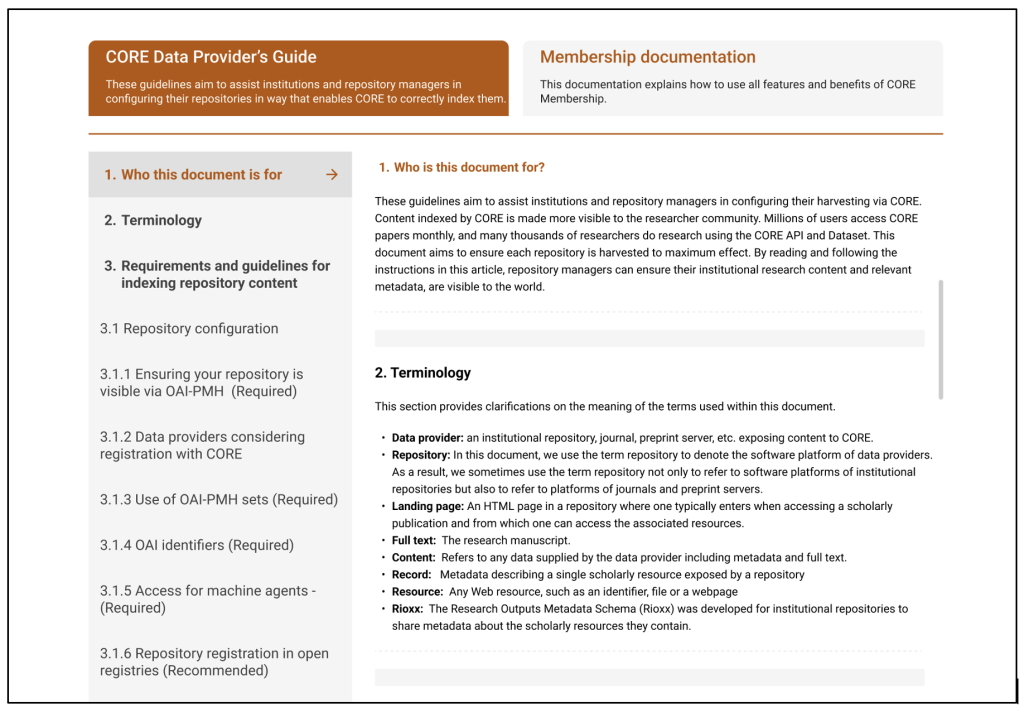For a data provider, being indexed by CORE is a straightforward process as indexing is done via OAI-PMH which is a standard protocol for repository interoperability. Most common repository platforms such as EPrints, DSpace or Open Journal Systems (OJS) support OAI-PMH. There are however several additional stages that can be undertaken to ensure the repository is best configured to enable CORE to index the repository’s content to maximum effect.
In an ongoing effort to help our Data Providers, CORE has introduced a detailed new guide that provides a wealth of information for repository managers and others. The new guide covers everything including how the repository should be configured for OAI-PMH. It is, sadly, a fairly common problem that the OAI-PMH endpoint of a repository is misconfigured or not functional. This can occur even when other functionalities of the repository appear to be working without issues. This has a huge impact on how visible the repository is to the outside world, and subsequent ramifications for the discoverability of its content.
The new guide covers best practices for repositories for metadata and metadata formats and includes recommendations for exposing this information in the most interoperable way. CORE supports several application profiles for metadata;
i. Dublin Core / Extended Dublin Core (Minimum)
Dublin Core is one of the simplest and most widely used metadata schemas. An extended version was formalised as the DCMI Metadata terms in 2020, with approximately 70 data fields.
ii. OpenAIRE Guidelines (Supported)
The OpenAIRE Guidelines were established to support the Open Access strategy of the European Commission and to meet the requirements of the OpenAIRE infrastructure. By implementing these Guidelines, repository managers will enable authors who deposit publications in their repository to fulfil the EC Open Access requirements.
iii. RIOXX v3 (Recommended)
CORE recommends that repositories use RIOXX v3, which we consider to be the most suitable metadata application profile for describing scholarly research outputs. Rioxx: The Research Outputs Metadata Schema was developed for institutional repositories to share metadata about the scholarly resources they contain. Rioxx was designed to meet the reporting requirements of Research Councils UK (RCUK).
Also covered in the guide are OAI (Open Archives Initiative) identifiers. In regard to making a repository more visible, an OAI identifier is a unique identifier of a metadata record within a repository. Using OAI identifiers allows linking to the repository’s version of record, rather than to a publisher’s website. CORE registers OAI identifiers supplied by repositories during the harvesting process and uses them to deliver a global OAI Resolver service.
A lot of other information is also provided that can help repositories with a number of different aspects such as ensuring their content is machine readable, particularly by using FAIR Signposting, and ensuring that the repository is correctly indexed by open registries of repositories and journals, such as OpenDOAR and the Directory of Open Access Journals.
There are many levels to make sure a repository is best configured for visibility and interoperability and the guide gives clear and concise information for repository managers navigating this landscape. Further, Data Providers that are registered with CORE can also claim free access to the CORE Dashboard which provides an online view of a repository’s status and provides various tools for monitoring and managing repository content.
Click the following link to access the latest version of the CORE guidelines for Data Providers.
If you have any questions about the new guide, CORE membership or the CORE Dashboard, do get in touch, we’re always happy to see how we can help.

